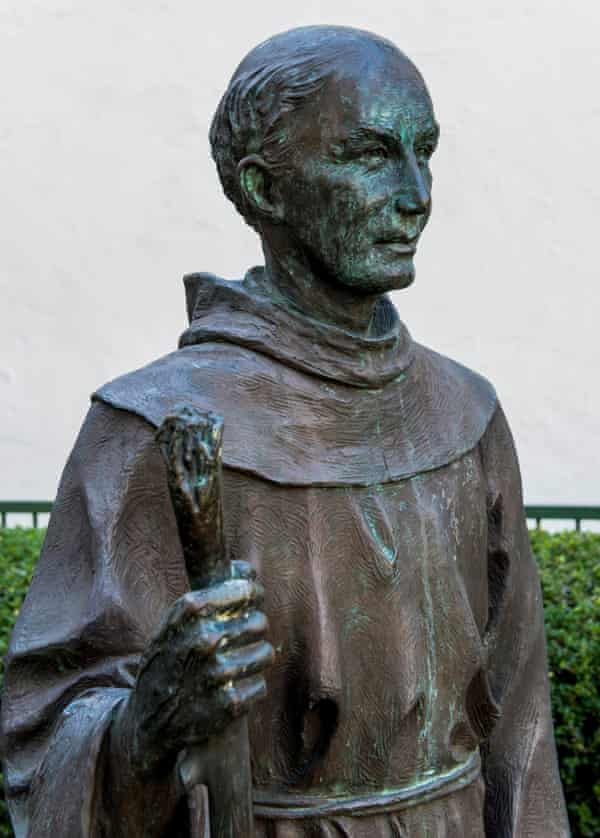Fray Junipero Serra Withing a Few Days, Eleven Little Babies
A story well-nigh conquest, religion and the Americas, central to a founding myth of California, volition end this twelvemonth with the pope bestowing sainthood on a man many see every bit guilty of "slavery" and "violent evangelism".
Pope Francis announced last week that he plans to canonize Junípero Serra, "the evangelizer of west in the United States", in a ceremony in Washington this autumn. The 18th-century missionary would officially become a saint.
Notwithstanding many of the people descended from those who first encountered Serra have a starkly unlike view of the Castilian friar. Sainthood for the friar would honor the actions of a brutal colonizer, many Native Americans protest.
Ron Andrade, executive director of the Los Angeles Metropolis/County Native American Indian Commission, compared Serra to Hitler and the Spanish conquistadors who subjugated South America. Andrade, a Luiseño, said Serra "decimated 90% of the Indian population". "Why doesn't the pope canonize Pizarro or Cortez? Information technology'southward impaired."
"Everywhere they put a mission the majority of Indians are gone," Andrade said, "and Serra knew what they were doing: they were taking the land, taking the crops, he knew the soldiers were raping women, and he turned his head."
Many tribes, including the Luiseños, Juaneño and Gabrielino-Tongva, survived the mission era through fractional integration with each other and Spanish culture, but others fled inland or lost their civilisation completely, Andrade said.
"Serra was not the face of evil", says Deborah Miranda, a professor of literature at Washington and Lee Academy and an Ohlone Costanoan Esselen Indian. "But there were and so many atrocities happening and he airtight his eyes," she said. "I don't think he should be rewarded for that."
For Miranda, Serra's complicity outweighs whatever intentions he had. He was driven by ambition, she said, and in his want to produce results for Spain he "laid the groundwork to erase our cultures and impose this burden of shame on Indians about being Indian".
Serra came to the American territories in 1749 every bit an accomplished Franciscan, and afterward two decades of mission work the Spanish crown sent him with an army excursion to establish settlements along the Pacific coast – earlier the Russians or British were able. In 1769 he founded the Mission of San Diego, the commencement of nine missions, and traveled as far north as San Francisco Bay.
Those missions irrevocably contradistinct life for the people along the declension, whom Serra tried to convert every bit the regular army congenital fortresses nearby. "Information technology was a very difficult time for California Indians," says professor Steven Hackel of the University of California, Riverside and the author of Junípero Serra: California'due south Founding Father.

"They went to missions considering they had few other options," he said, since diseases devastated the tribes and the invasive plants and animals brought past the Castilian for agriculture overwhelmed native food sources.
Missions appeared to be "a place for them to rebuild their communities", Hackel said.
Yet, according to Miranda, as populations grew they became "affliction factories". Historians estimate that hundreds of thousands of Native Americans died in the decades after Europeans arrived, mostly killed past diseases.
Converts were taught to farm, breed livestock and alive in regimented communities. They were flogged for defiance, captured if they tried to flee, and sometimes raped by soldiers of the local garrisons.
French explorer Jean François de Galaup de la Pérouse, Serra's contemporary, wrote that the missions treated "too much a kid, too much a slave, too petty a man" and were akin to slave plantations. On several occasions tribes tried to defection, until eventually new settlers took over the missions.
"Serra didn't believe you could beat Catholicism into an Indian," Hackel said, "simply he saw them as children, and in the early on modern period good fathers corrected their kids through corporal punishment.
"I'chiliad not trying to let Serra off the hook, but we need to sympathise how he understood the world." Hackel said no matter what, "the Catholic church needs to practise more than work" to hear Native Americans' concerns.
David McLaughlin, historian and executive director of the California Missions Resources Center, said that Serra should be said as a talented just flawed man of his fourth dimension. He "lived an exemplary religious life by the terms of his day", McLaughlin said, and the missions could be perceived equally a"modification" that tried to reform the strategies that had devastated Cardinal America and Peru.
Father Tom Elewaut, a priest at San Buenaventura Mission – the final of Serra's missions – defended the friar against criticism while acknowledging that colonization "was a tragedy" for its consequences. "Serra was a protectorate of the Native Americans," Elewaut argued, saying that the friar never intended the spread of disease and cared deeply for Native Americans.
Serra prevented yet more garrisons from springing up near missions, McLaughlin and Elewaut noted, proverb that he finer guarded Native Americans from soldiers even if he had political considerations to do and so.
"Times change" was Elewaut's ultimate defense of Serra. "We had corporeal punishment in schools when I was a child, and information technology wasn't devastating." Only Serra was "very respectful" to Native Americans who refused to convert, Elewaut protested, though he admitted the church should endeavour to reconcile Native Americans' "real hurt". Elewaut said the best thing for the church and native people may be to embrace Serra'south own motto: "'Siempre adelante, nunca atras' – always forrard, never back."
For Miranda and others, the consequences of Serra's make of colonialism live on today. "Treating Indians as less than human being, or equally children who could never grow up, created a sort of psychological trauma," she said. "I don't deny that cultures evolve, but more than agency in the evolution could non have been bad."
Source: https://www.theguardian.com/world/2015/jan/25/pope-francis-junipero-serra-sainthood-native-american-controversy
0 Response to "Fray Junipero Serra Withing a Few Days, Eleven Little Babies"
Post a Comment